Are you interested in diving into the exciting world of data science? Look no further! Whether you’re a beginner seeking to explore this dynamic field or an experienced professional looking to enhance your skills, we have the best online courses for you.
In today’s world, data is not just a collection of numbers and figures. It’s a valuable resource that can be applied to drive business success.
The demand for Data Scientists is only going to increase as companies continue to gather huge amounts of data. And let’s be honest, who doesn’t want to be a part of a field that has the potential to impact so many industries?
And it’s currently the best time to gain knowledge on data science to get an exciting and rewarding career.
Glassdoor reports that the average base salary for a Data Scientist in the United States is $1,03,973 per year, with top earners making over $180,000 annually.
There are a number of resources available online, and it can be difficult to know where to start. That’s why it’s important to take a structured & well-organized course to master the skills required for a successful career in Data Science.
Challenges
Here are some common challenges that individuals often face while taking data science courses, along with strategies to overcome them:
Steep Learning Curve
Data science encompasses a wide range of complex concepts and techniques, which can be overwhelming for beginners. Overcoming this challenge requires patience and a systematic approach.
Start with the fundamentals, understand key concepts thoroughly, and gradually build upon them. Break down complex topics into smaller ones and practice regularly to reinforce your learning.
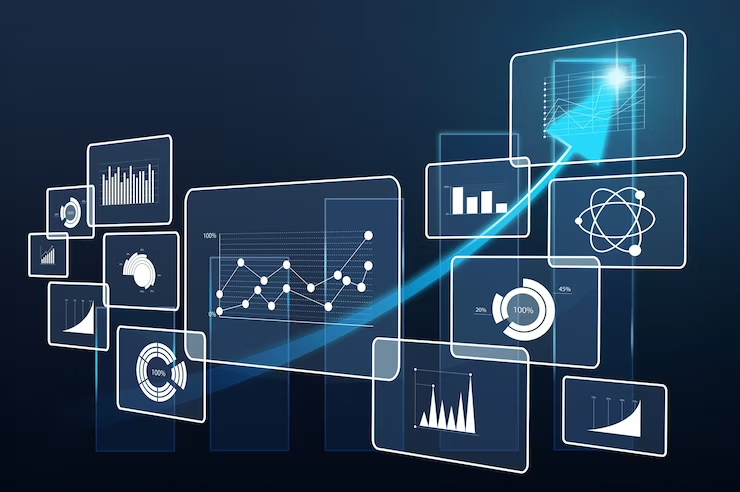
Mathematical Background
Data science involves various mathematical concepts such as statistics, linear algebra, calculus, and probability theory. For individuals without a strong mathematical background, this can pose a significant challenge. To overcome this, dedicate extra time to brush up on the necessary mathematical concepts.
Look for online tutorials, textbooks, or supplementary resources that explain these concepts in a data science context. Additionally, practice applying these concepts to real-world data problems.
Programming Skills
Proficiency in programming languages like Python or R is crucial for data science. Just begin by learning the basics of your chosen programming language, including syntax, data structures, and control flow. Utilize online coding platforms, tutorials, and coding exercises to practice writing code.
In this article, we’ve done the hard work for you and put together a list of some of the best Data Science courses available online.
Let’s get started!
IBM Data Science Professional Certificate
If you’re really interested in pursuing a career in data science or machine learning, then this certification course by IBM could be the perfect choice for you. This course program is designed to help you develop the relevant skills necessary to succeed in the field of data science.
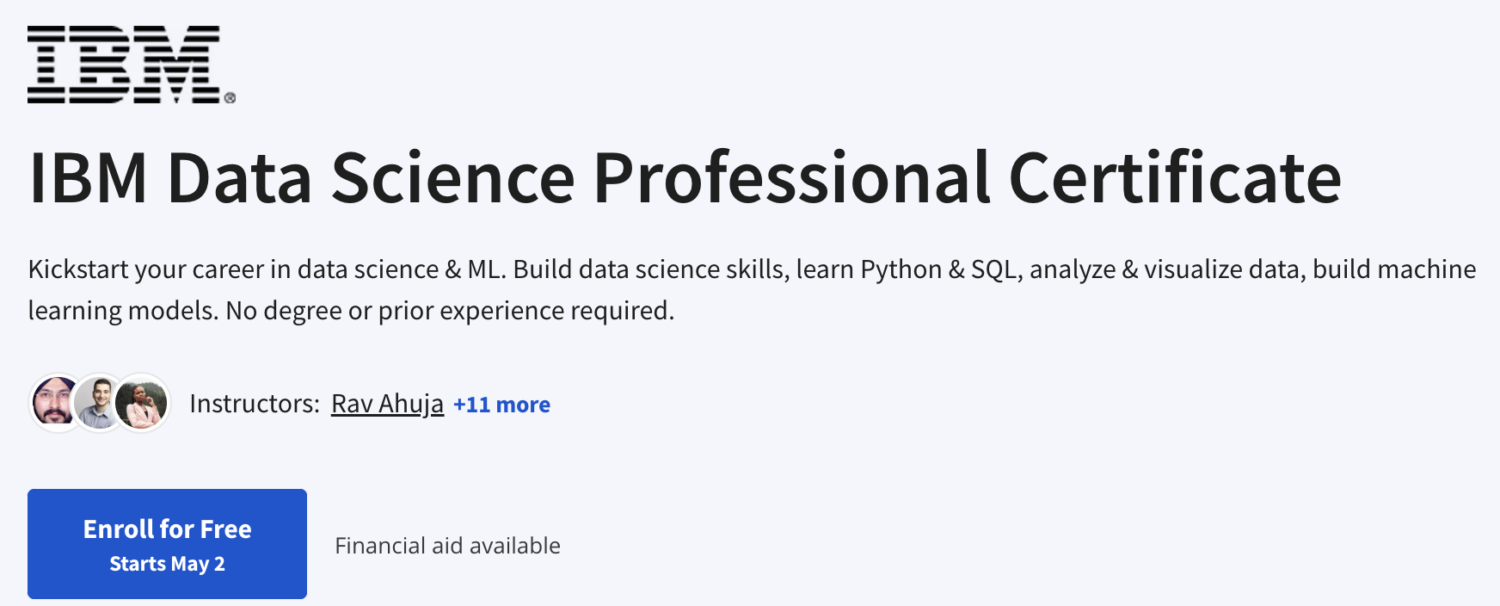
This 10-course series includes a range of assignments & projects that students can participate in, such as developing a machine learning model, examining social media data, and developing a data dashboard.
These tasks give learners the opportunity to apply the skills they’ve learned to real-world problems and build a portfolio of work that they can showcase to potential employers.
Additionally, learners will receive a Professional Certificate from Coursera and a digital badge from IBM which demonstrates their mastery of the skills learned. This program is ACE® recommended. It means that upon completion, learners can earn up to 12 college credits.
This certification is a great way to gain a competitive edge in the job market as an entry-level data scientist with the latest job-ready skills.
What you’ll learn?
- The fundamentals of data science include data analysis, data visualization, and statistical analysis.
- How to use open-source tools and libraries,, including Pandas, NumPy, Matplotlib, Seaborn, Scikit-learn, and ScipPy.
- Building predictive models using machine learning algorithms.
- How to work with databases and use SQL to query data.
- Applied learning through hands-on labs in the IBM Cloud using real-world data sets & tools.
Harvard Professional Certificate in Data Science
This is a professional certification course offered by Harvard University on the edx platform.
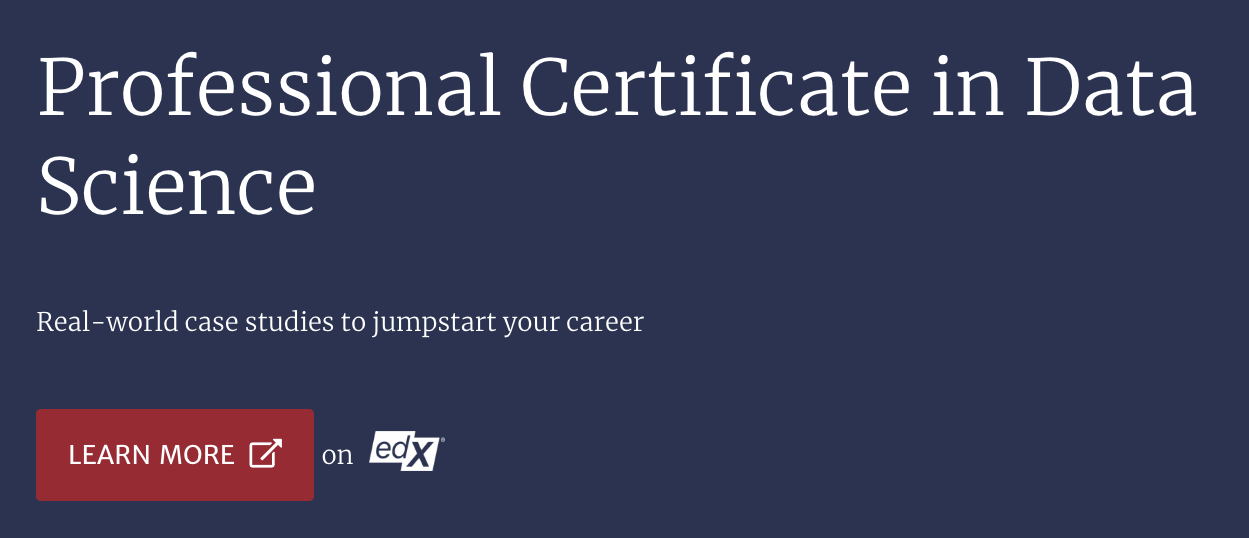
This program will take your data science skills to the next level by helping you implement ML algorithms and gain in-depth knowledge of fundamental data science concepts through motivating real-world case studies.
You will gain fundamental R programming skills and learn statistical concepts such as probability, inference, and modeling.
This course is more than just a collection of technical skills.
You will gain experience in techniques such as data visualization and data wrangling with ggplot2 /dplyr.
You will also become familiar with essential tools for practicing data scientists, such as Unix/Linux, Git, and RStudio.
But that’s not all.
The case studies in the course are designed to inspire and help you learn by answering specific questions through data analysis. You’ll explore topics like trends in world health & economics, US crime rates, and many more.
Skills You’ll gain
- Machine Learning algorithms
- Git and GitHub
- R programming
- probability related concepts
Python for Data Science and ML
It’s one of the most popular courses on the Udemy platform. Lakhs of students from all over the world have enrolled in this course and have found it to be a valuable resource for advancing their skills in data science and machine learning.
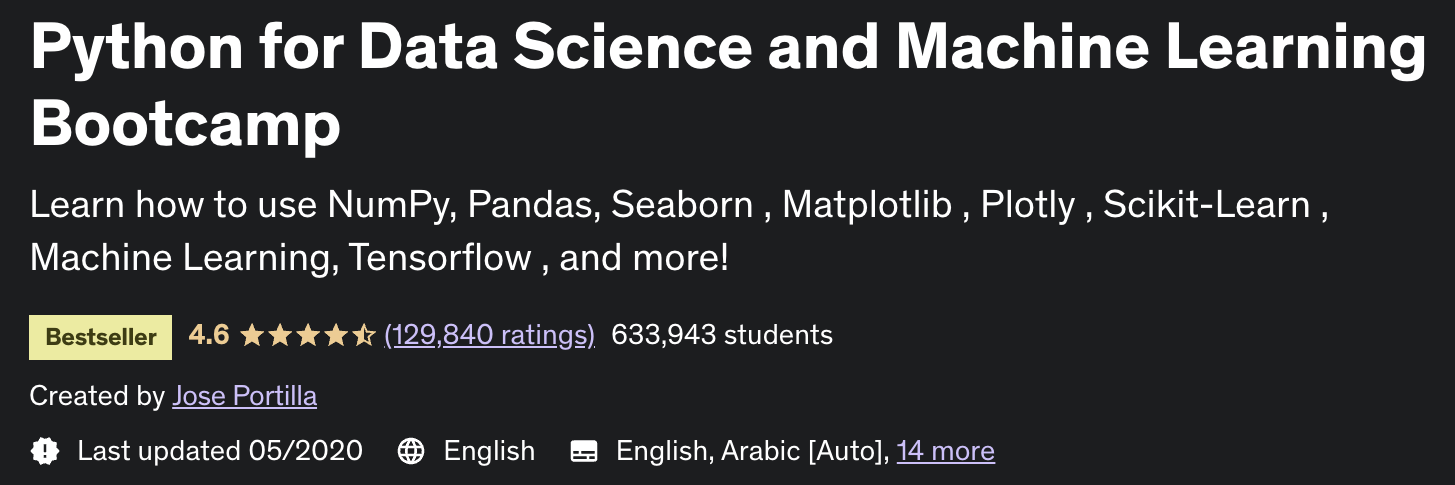
This course also covers advanced data visualization techniques using libraries like Matplotlib, seaborn, and Plotly. You’ll learn how to create stunning visualizations that will bring your data to life and make it easier to understand and analyze.
But the real excitement starts when you dive into machine learning with SciKit Learn. You’ll learn about a wide range of machine-learning algorithms like Random Forests, Decision Trees, and many more.
This course offers an excellent curriculum that covers various topics related to Data Science and Machine Learning. It includes over 100 high-definition video lectures that provide in-depth explanations & demonstrations. Detailed code notebooks are provided for each lecture which allows learners to practice and apply what they’ve learned.
What you’ll learn?
- Web scraping
- Connecting Python to SQL
- Machine Learning
- Decision trees
- Natural Language Processing (NLP)
So what are you waiting for? Enroll in this course today and take your first step towards an exciting career in data science.
Data Science Specialization
This Data Science specialization course is offered by Johns Hopkins University. There are a total of 10 courses in this specialization. It is designed to equip learners with the essential concepts and tools required for the entire data science pipeline.
A highlight of this specialization course is the Capstone Project, where you’ll have the opportunity to apply what you’ve learned by building a data product using real-world data. This hands-on experience allows you to showcase your mastery of the material and create a portfolio that reflects your abilities.
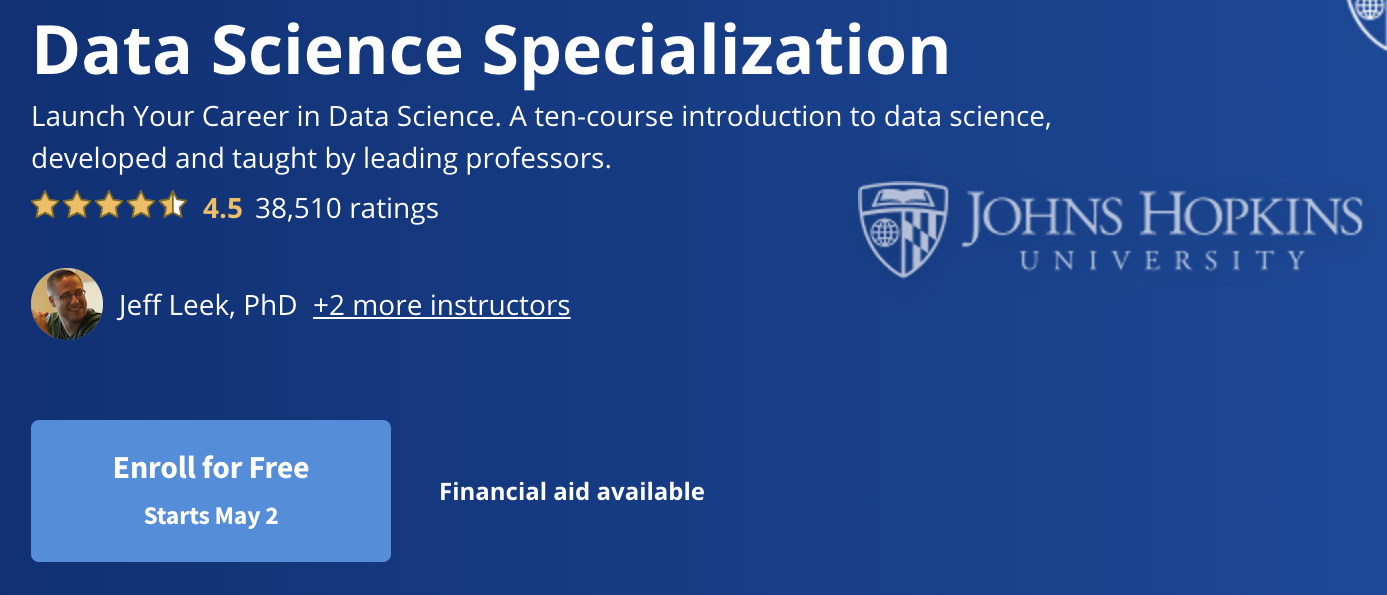
This course is developed and taught by experienced faculty from Johns Hopkins University. You can expect high-quality instruction and guidance throughout the course.
In the course assignments, You’ll have to perform regression analysis and use regression models to gain deeper insights into your data which will help you to become a true data scientist.
What you’ll learn?
- Machine Learning
- Regression analysis
- Github
- R programming
- Cluster analysis
- Regular Expression (REGEX)
Data Science with R and Python
This course is offered by Oak Academy on the Udemy platform. The course’s content can be broadly divided into two parts.

Part 1: R for Data Science
In the first part of the course, you will dive into the world of data science using R. You will learn how to effectively handle large datasets, manipulate data, and derive meaningful insights. The course will introduce you to essential tools in R that are commonly used in data science projects.
Part 2: Python for Data Science
The second part of the course focuses on utilizing Python for data analysis. You will learn how to analyze data, create visualizations, and apply powerful machine-learning algorithms. You can improve your understanding of Python and its libraries, including NumPy, Pandas, and Matplotlib, through various exercises.
Also read: Books and courses to learn numpy
By the end of the course, you can expect to achieve the following:
- Proficiency in R and Python for data science tasks.
- The ability to create informative and visually appealing data visualizations.
- Understanding and practical application of powerful machine learning algorithms.
- Competence in using essential libraries such as NumPy, Pandas, matplotlib, and tidyverse.
Google Data Analytics Professional Certificate
The Google Data Analytics Professional Certificate offered on Coursera is an excellent program designed to provide professional training in the field of data analytics.
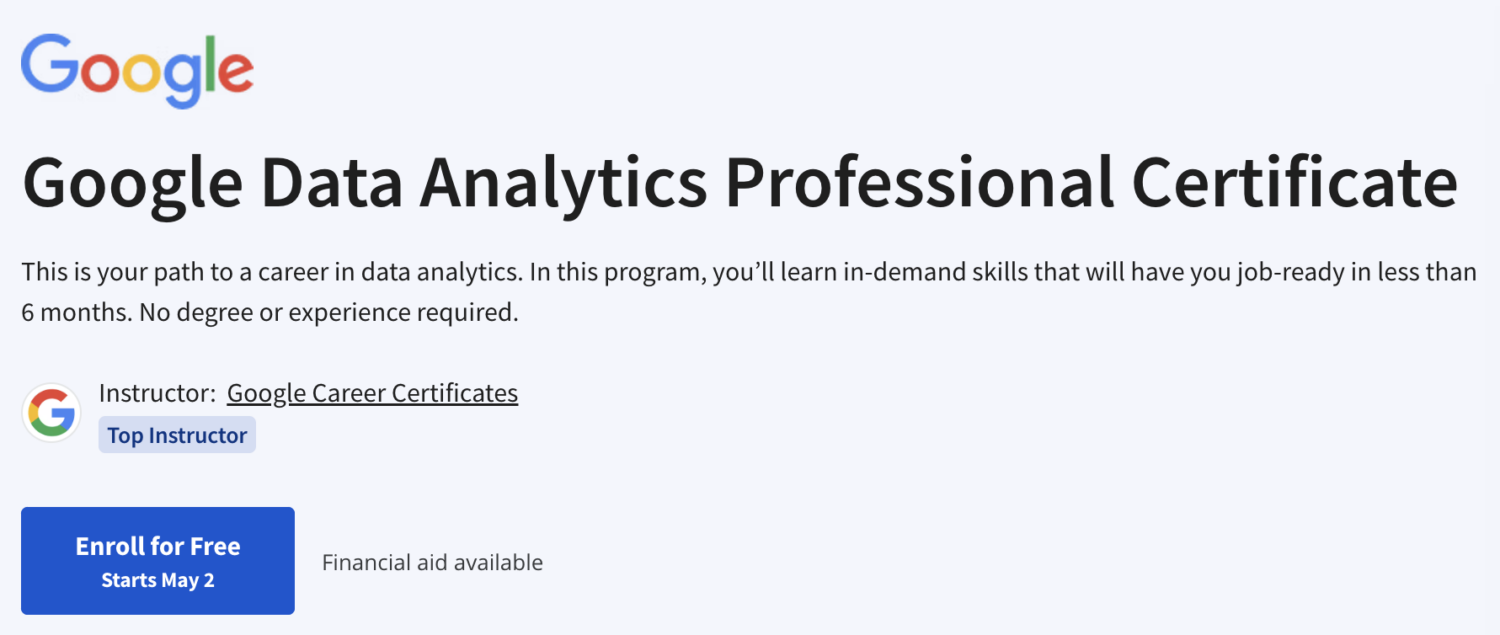
This certificate series consists of 8 courses that provide learners with in-demand skills necessary for entry-level positions in data analytics regardless of prior experience.
Throughout this certification program, you will have the opportunity to learn from Google employees who have built their careers on strong foundations in data analytics. The curriculum is well-structured to make sure that you gain the skills & knowledge required for success in the field.
You can complete the entire certification course in less than six months with a commitment of under 10 hours per week. sounds good, right?
Upon completion, you will be prepared for various job roles, including junior or associate data analyst, database administrator, and more.
The program includes over 180 hours of instruction and numerous practice-based assessments that simulate real-world data analytics scenarios. These assessments are important for developing the skills essential for workplace success.
The content is highly interactive and exclusively developed by experienced Google employees who have spent decades working in data analytics. You will engage with a variety of learning materials, such as videos, assessments, and hands-on labs, to familiarize yourself with the tools and analytical skills needed to work with data.
Skills you’ll gain
- Data Visualization (DataViz)
- Problem-Solving
- Spreadsheet
- Structured Query Language(SQL)
- Data Collection
Data Scientist Nanodegree Program
The Data Scientist Nanodegree program offered by Udacity is an advanced program designed to provide students with the necessary skills and knowledge to pursue Data Scientist roles.
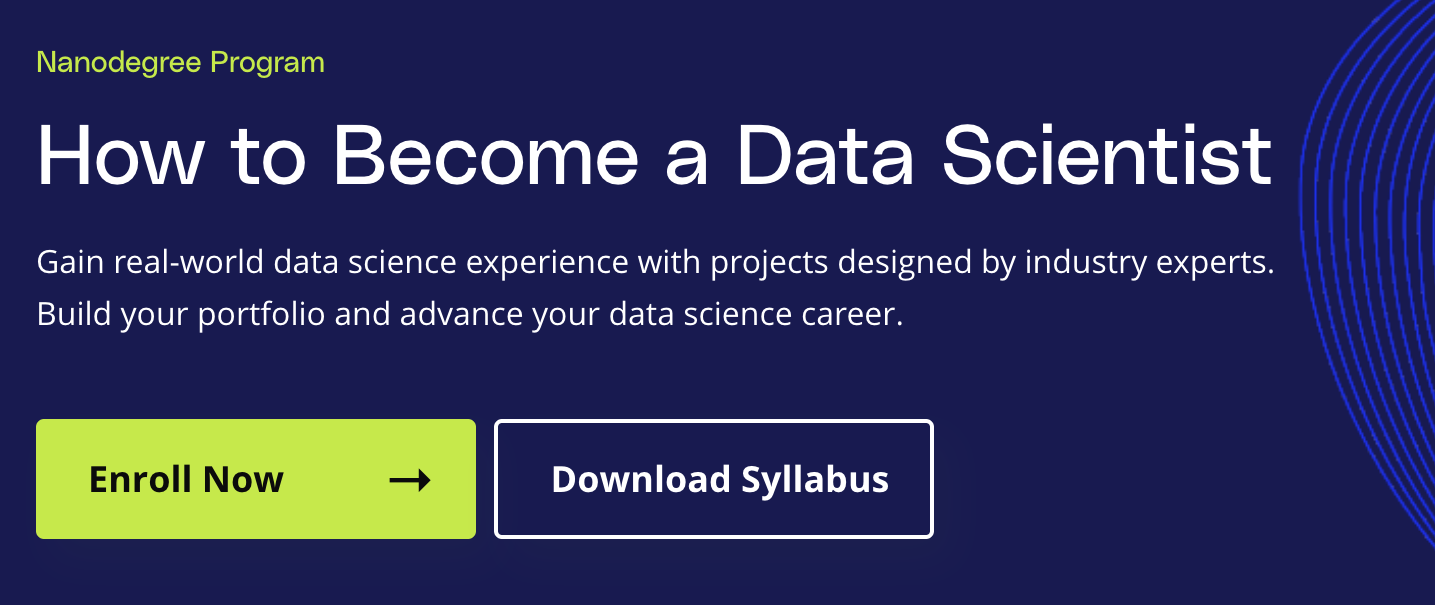
Before starting the program, it is beneficial to meet the following prerequisites:
Python: Proficiency in Python programming is needed, including the ability to write functions, build basic applications, and familiarity with common libraries such as NumPy and Pandas.
Additionally, students should have experience with SQL programming, including querying databases and using joins, aggregations, and subqueries. Comfort with using the Terminal and GitHub is also advantageous.
Probability and Statistics: A solid understanding of descriptive statistics, such as calculating measures of center and spread, is needed. Knowledge of inferential statistics, such as sampling distributions and hypothesis testing, is also necessary.
Data Wrangling and Visualization: Students should have experience accessing various types of data sources such as databases, CSV files, and JSON files. Proficiency in data cleaning and transformations using libraries such as pandas and Scikit-learn is important.
Knowledge of data visualization techniques using tools like Matplotlib is also valuable. Additionally, students should be familiar with exploratory & explanatory data analysis visualization methods.
The estimated time to complete the program is four months, during which learners will engage in hands-on projects developed by industry experts. Through these projects, participants will have the opportunity to work on real-world data pipelines, design experiments, build recommendation systems, and deploy solutions to the cloud.
This Nanodegree program is particularly suitable for individuals who already possess some experience in machine learning.
Tableau 2022 A-Z
This course is designed to equip you with the skills you need to become a proficient Tableau user.
Starting with the fundamentals, you’ll learn how to navigate the Tableau software, connect it to data files, and export worksheets. You’ll study data extraction and time series analysis to discover trends and create accurate predictions.

Upon completion of this course, you’ll be equipped with the skills of a proficient Tableau user and a data scientist. You’ll be able to extract info from data, analyze complex questions, and visualize your output with ease.
Whether you’re working with scientific data or aiming to improve business profits through forecasting trends, this course empowers you to collect, examine, and present data effectively.
Join this course now and take your Tableau skills to new heights!
what you’ll learn?
- Create Barcharts, Maps, Scatterplots, Treemaps, and Interactive Dashboards.
- Work with Data Blending in Tableau
- Assigning Geographical Roles to Data Elements
- working with time series data
SQL for Data Science
This course on Coursera is a great starting point for anyone interested in analyzing data for data science purposes. No prior knowledge of SQL is required. It takes you from the basics to more advanced concepts that help you develop the skills needed to extract valuable insights from data.
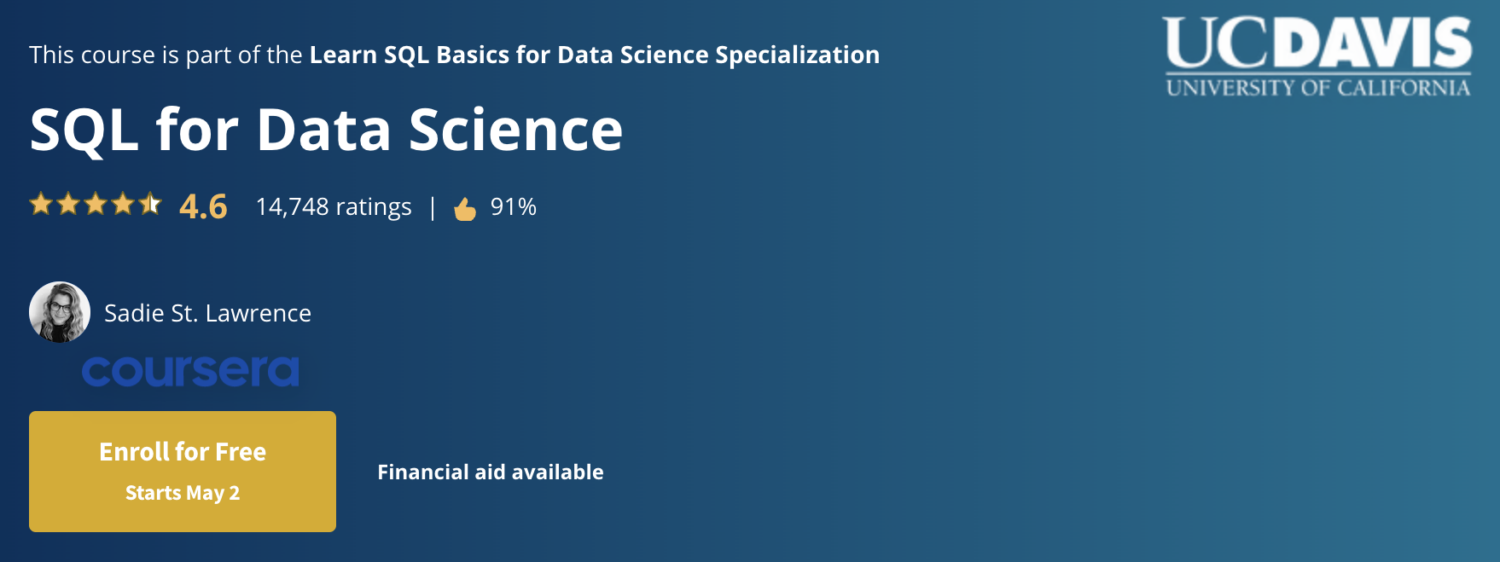
In the beginning, you’ll learn the fundamentals of SQL, including how to write queries to retrieve data from tables. The course gradually introduces you to more complex queries and teaches you techniques to filter & refine your results. You’ll work with different data types like strings and numbers and gain hands-on experience in manipulating data by creating new tables and moving data between them.
Throughout the course, you’ll become familiar with common SQL operators & discover how to combine data from different sources. Advanced topics such as case statements, data governance, and profiling are also covered, which gives you a clear understanding of SQL for data science purposes.
It also includes real-world programming assignments. These assignments allow you to practice your skills and analyze actual data sets. you’ll also be able to use SQL effectively for targeted analysis by interpreting the structure, meaning, and relationships within the data.
No specific prerequisites or software requirements are necessary for this course. Although having a simple text editor will be useful for the final project.
What you’ll learn?
- Data subset selection
- SQLite
- Data Filtering and Sorting
- Manipulation of Strings
Data Science with R
This course begins by introducing you to the practice of data science and familiarizing you with the fundamentals of the R programming language. You’ll gain an understanding of how data science can be applied to extract valuable information from raw data.
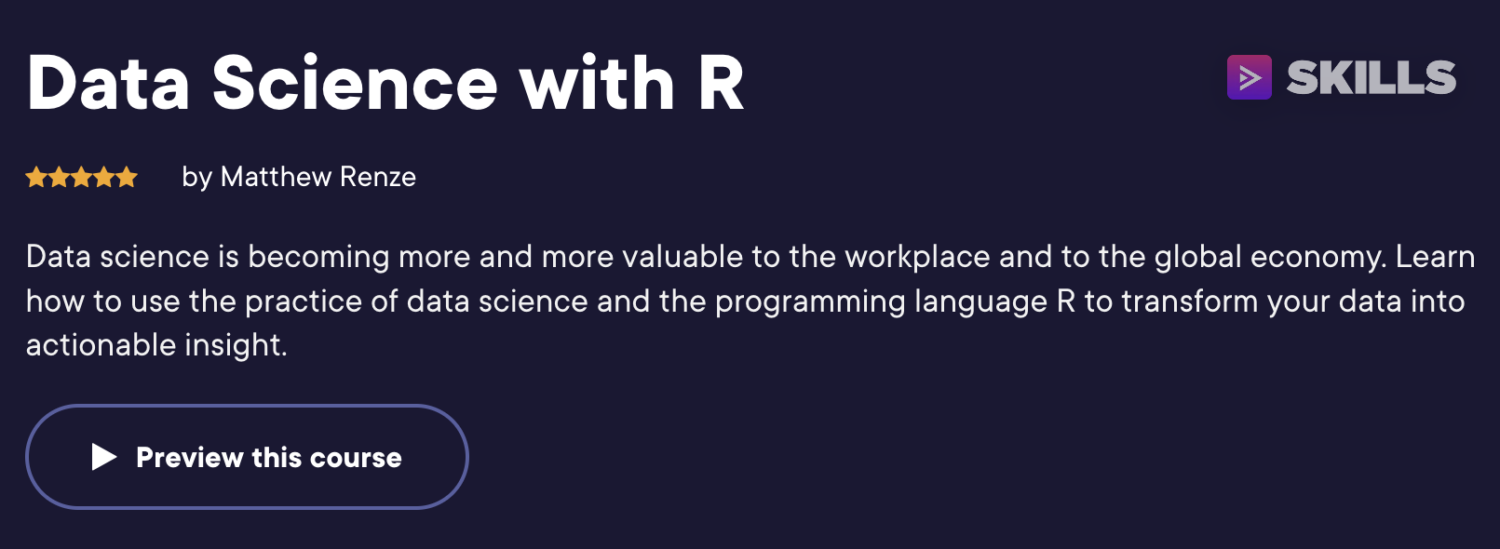
Once you have a solid foundation, the course delves into the process of transforming and cleaning data. You’ll learn techniques to handle messy and unstructured data. Additionally, you’ll discover how to create descriptive statistics, which allow you to summarize & gain insights from your data effectively.
You’ll learn how to build models that can uncover relationships within your data and make predictions based on those relationships. This skill set is particularly valuable when attempting to uncover hidden patterns or forecast future outcomes.
As you already know, Machine learning algorithms play a vital role in data science. And this course provides an introduction to this ML algorithms. You’ll discover how to apply machine learning techniques using R, which enables you to make predictions and draw conclusions from your data.
Understanding these algorithms empowers you to solve complex problems & uncover valuable patterns within your datasets.
Finally, the course covers the deployment of R models into production. You’ll learn how to package your code, create interactive applications, and share your insights with others.
This practical knowledge allows you to bridge the gap between data analysis and real-world implementation. Whether you are a beginner or an experienced data professional, this course equips you with the knowledge and techniques needed to excel in the field of data science.
What you’ll learn?
- Creating statistical models and data visualizations
- Handling Big Data
- R language
- ML algorithms
Conclusion
Data science is a practical field, and hands-on experience is needed for mastery. However, accessing and working with real-world datasets can be challenging. Seek out open-source datasets available online or through platforms like Kaggle.
Participate in online competitions, contribute to open-source projects, or create your projects using publicly available data. Building a portfolio of data science projects will not only provide valuable experience but also demonstrate your skills to potential employers.
I hope you found this article helpful in learning about various courses for learning data science. You may also be interested in learning about the best data science books to learn from theory to practical applications [2023 Edition].
-
Hey there, my name is Ashlin, and I’m a senior technical writer. I’ve been in the game for a while now, and I specialize in writing about all sorts of cool technology topics like Linux, Networking, Security, Dev Tools, Data Analytics, and Cloud… read more

















